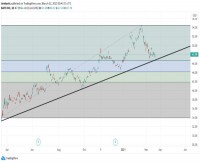|
Opalesque Industry Update - Sustainability continues to be a hot topic issue. From the Paris Climate Accord, to the sourcing of food or the treatment of the individuals involved in the production of goods, sustainability has become an increasingly prominent issue in global news and can directly impact consumers' perception of individual companies and, ultimately, a company's bottom line. As social media continues to highlight the extent of damage that can be done when a company's pollution of the environment or unethical treatment of employees or animals is placed under the microscope, investors are stepping up the importance they ascribe to sustainability reporting.
Though sustainability reporting is still in its early stages for most firms, heightened attention to the topic and efforts to enhance the consistency and quality of sustainability reports make it clear that the focus on sustainability isn't going away anytime soon. Given this reality, The New York Alternative Investment Roundtable recently sponsored the third day-long Sustainability Investment Leadership Conference (SILC), where attendees were surveyed about the topic. "Regulation requires companies to report on some sustainability matters that they otherwise might not have reported on… but once companies start to focus on a sustainability matter, they tend to go well beyond the minimum compliance requirements," said Michael Littenberg, a partner at global law firm Ropes & Gray. Noting that regulation is not the only catalyst driving companies to enhance sustainability disclosure, however, he added: "pressure is coming from many areas, including from NGOs, peers, competitors, customers and even internal stakeholders." One particular area of concern relates to sustainability reporting. This SILC event highlighted some of the risks related to the supply chain and the importance of companies being aware of and transparent about such risks. "In the past, you could have a problem somewhere in a factory or in the supply chain that wouldn't be brought to the public's attention, but today everything is immediate through social media and mainstream media. You can no longer just hide and hope it goes away," said Christian Frutiger, global head of public affairs for Nestlé S.A., commenting on the importance of companies being aware of any risks they are exposed to in their supply chains and actively managing such risks and sharing this information with investors. "Social media is a reality and it's here to stay," he said, noting that a lot of damage that can be done to a company's brand through social media controversies. Nonetheless, he believes the speed of social media provides a great opportunity to bring a brand's story to consumers, such as the positive impacts of sustainable sourcing on farming communities. Roundtable members believe that sustainability reporting is becoming increasingly important for companies across the board, regardless of size or industry. 73% of respondents to this year's survey said that they believe sustainability reporting is equally important for all companies, compared with 70% of respondents in 2017, 65% of respondents in 2016 and 41% in 2015; while only 27% of respondents believe sustainability reporting is more important for large, international companies, compared with 30% in 2017, 35% in 2016 and 59% in 2015. "As issues related to sustainability are increasingly highlighted by the media and become a regular part of the conversation, the importance of sustainability reporting has moved to the forefront of investors' minds," said Adam Weinstein, President of the New York Alternative Investment Roundtable and a managing director at an alternative asset management firm. "Given the rising importance of sustainability to companies' bottom lines, The New York Alternative Investment Roundtable will maintain its dedication to examining the topic and promoting best practices in this area." New York Alternative Investment Roundtable members had the opportunity to weigh in on this topic both at the SILC event, as well as through an online electronic poll. *Of the respondents to this survey, 29% were fund managers; 17% were allocators; 23% were risk management or trading; 22% were service providers; and 9% were other industry participants. Following are some of the key findings to this year's survey, compared with answers to the same questions in recent years:
|
Industry Updates
Alternative Investment industry believes sustainability reporting is increasingly important
Tuesday, June 12, 2018
|
|





 RSS
RSS








